Ethical Considerations in Film: A Case Study of Mary Poppins
VerifiedAdded on 2022/07/04
|6
|1368
|89
Case Study
AI Summary
This case study examines the ethical issues arising from the adaptation of P.L. Travers's Mary Poppins into a film by Walt Disney. The analysis delves into the conflicting perspectives of Travers and Disney, highlighting ethical considerations such as the violation of intellectual property, the misuse of power, and the application of business ethics. The case explores the ethical issues, including Disney's downplaying of Mary Poppins's harsh side and the alteration of the script, and evaluates the ethical implications using theories like deontology and utilitarianism. The study also offers suggestions for decision-makers, emphasizing the importance of respecting original content creators, practicing forgiveness, and avoiding actions that could benefit unfairly from others' work. The study concludes by referencing relevant literature to support its arguments.
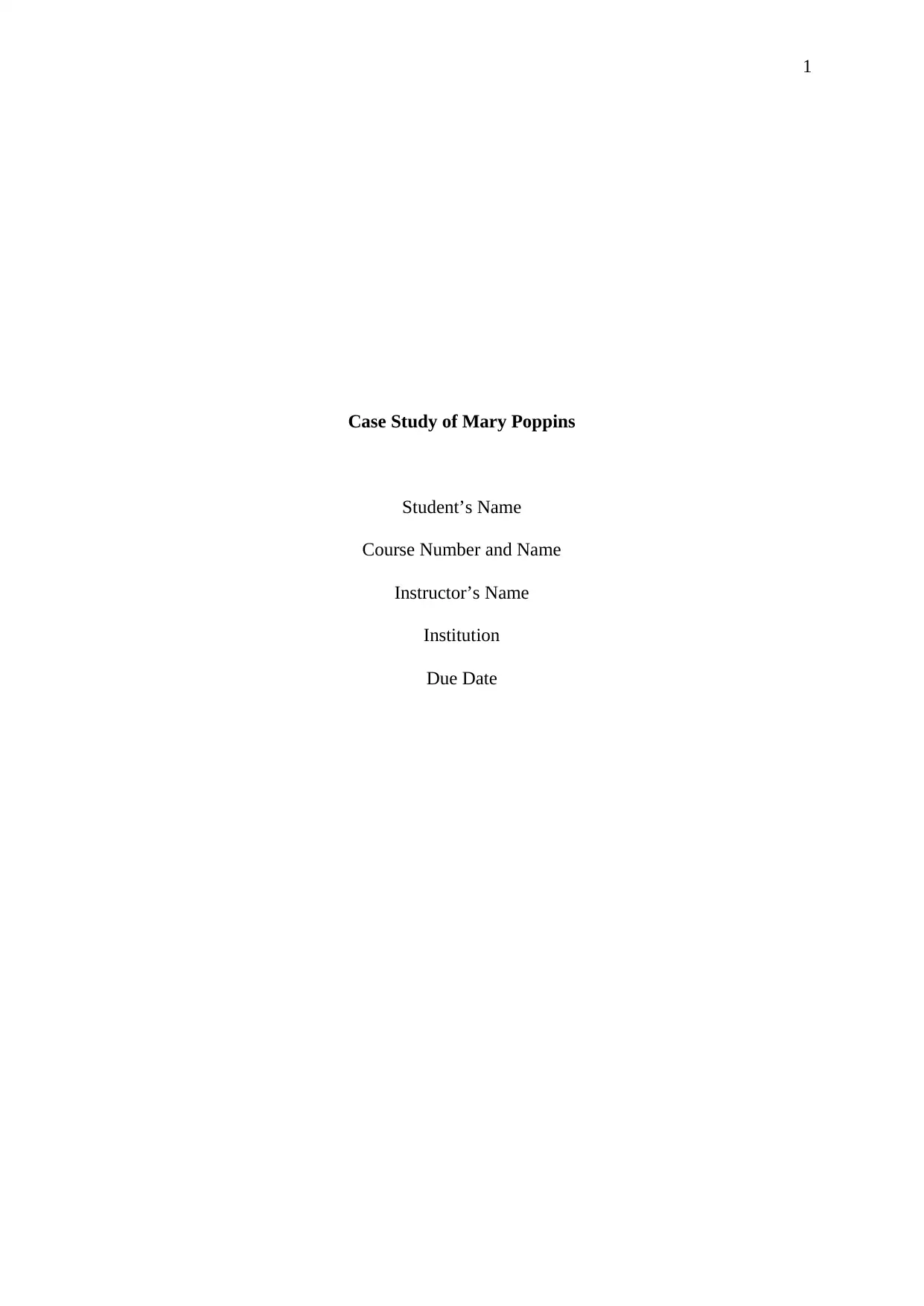
1
Case Study of Mary Poppins
Student’s Name
Course Number and Name
Instructor’s Name
Institution
Due Date
Case Study of Mary Poppins
Student’s Name
Course Number and Name
Instructor’s Name
Institution
Due Date
Paraphrase This Document
Need a fresh take? Get an instant paraphrase of this document with our AI Paraphraser
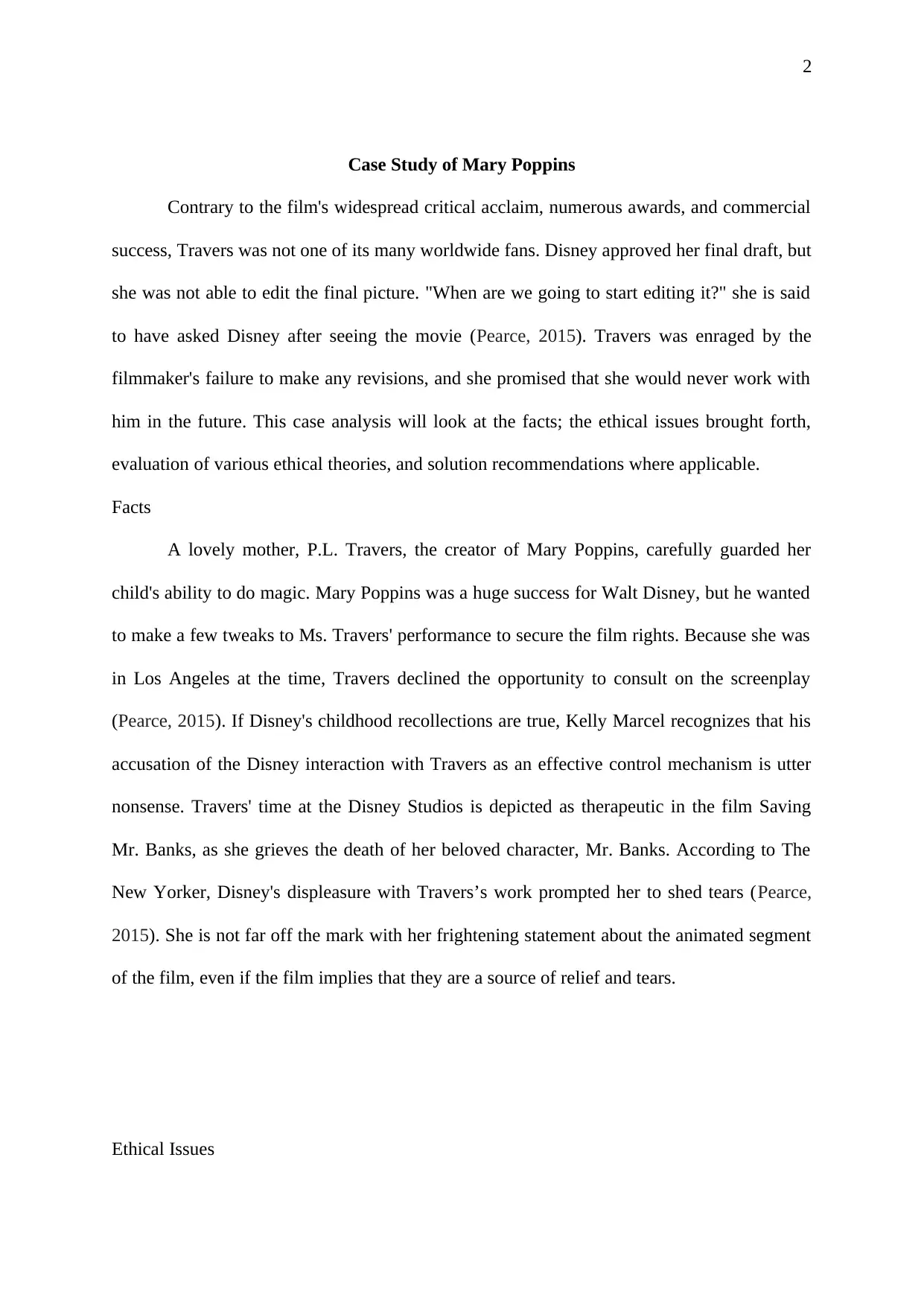
2
Case Study of Mary Poppins
Contrary to the film's widespread critical acclaim, numerous awards, and commercial
success, Travers was not one of its many worldwide fans. Disney approved her final draft, but
she was not able to edit the final picture. "When are we going to start editing it?" she is said
to have asked Disney after seeing the movie (Pearce, 2015). Travers was enraged by the
filmmaker's failure to make any revisions, and she promised that she would never work with
him in the future. This case analysis will look at the facts; the ethical issues brought forth,
evaluation of various ethical theories, and solution recommendations where applicable.
Facts
A lovely mother, P.L. Travers, the creator of Mary Poppins, carefully guarded her
child's ability to do magic. Mary Poppins was a huge success for Walt Disney, but he wanted
to make a few tweaks to Ms. Travers' performance to secure the film rights. Because she was
in Los Angeles at the time, Travers declined the opportunity to consult on the screenplay
(Pearce, 2015). If Disney's childhood recollections are true, Kelly Marcel recognizes that his
accusation of the Disney interaction with Travers as an effective control mechanism is utter
nonsense. Travers' time at the Disney Studios is depicted as therapeutic in the film Saving
Mr. Banks, as she grieves the death of her beloved character, Mr. Banks. According to The
New Yorker, Disney's displeasure with Travers’s work prompted her to shed tears (Pearce,
2015). She is not far off the mark with her frightening statement about the animated segment
of the film, even if the film implies that they are a source of relief and tears.
Ethical Issues
Case Study of Mary Poppins
Contrary to the film's widespread critical acclaim, numerous awards, and commercial
success, Travers was not one of its many worldwide fans. Disney approved her final draft, but
she was not able to edit the final picture. "When are we going to start editing it?" she is said
to have asked Disney after seeing the movie (Pearce, 2015). Travers was enraged by the
filmmaker's failure to make any revisions, and she promised that she would never work with
him in the future. This case analysis will look at the facts; the ethical issues brought forth,
evaluation of various ethical theories, and solution recommendations where applicable.
Facts
A lovely mother, P.L. Travers, the creator of Mary Poppins, carefully guarded her
child's ability to do magic. Mary Poppins was a huge success for Walt Disney, but he wanted
to make a few tweaks to Ms. Travers' performance to secure the film rights. Because she was
in Los Angeles at the time, Travers declined the opportunity to consult on the screenplay
(Pearce, 2015). If Disney's childhood recollections are true, Kelly Marcel recognizes that his
accusation of the Disney interaction with Travers as an effective control mechanism is utter
nonsense. Travers' time at the Disney Studios is depicted as therapeutic in the film Saving
Mr. Banks, as she grieves the death of her beloved character, Mr. Banks. According to The
New Yorker, Disney's displeasure with Travers’s work prompted her to shed tears (Pearce,
2015). She is not far off the mark with her frightening statement about the animated segment
of the film, even if the film implies that they are a source of relief and tears.
Ethical Issues
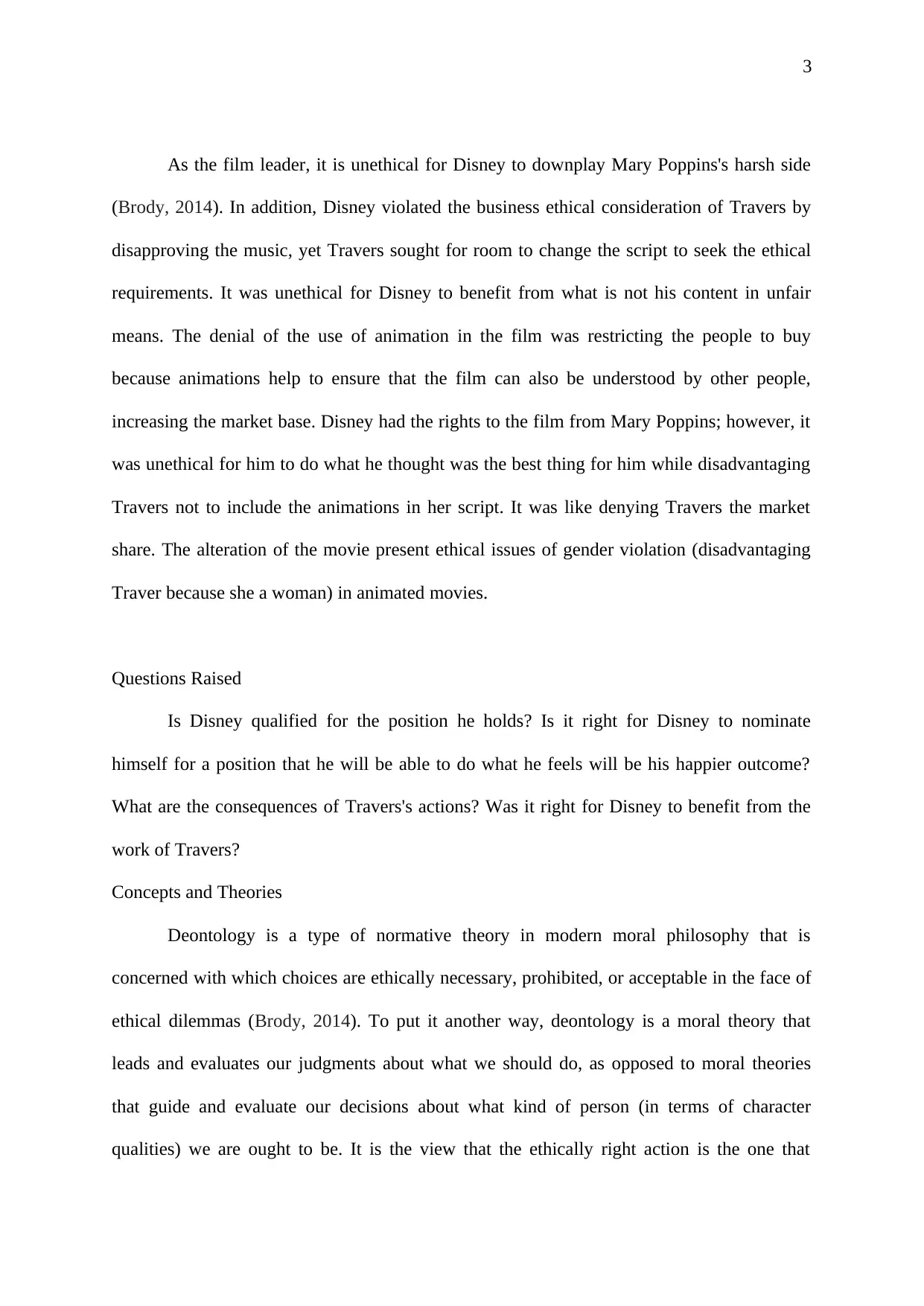
3
As the film leader, it is unethical for Disney to downplay Mary Poppins's harsh side
(Brody, 2014). In addition, Disney violated the business ethical consideration of Travers by
disapproving the music, yet Travers sought for room to change the script to seek the ethical
requirements. It was unethical for Disney to benefit from what is not his content in unfair
means. The denial of the use of animation in the film was restricting the people to buy
because animations help to ensure that the film can also be understood by other people,
increasing the market base. Disney had the rights to the film from Mary Poppins; however, it
was unethical for him to do what he thought was the best thing for him while disadvantaging
Travers not to include the animations in her script. It was like denying Travers the market
share. The alteration of the movie present ethical issues of gender violation (disadvantaging
Traver because she a woman) in animated movies.
Questions Raised
Is Disney qualified for the position he holds? Is it right for Disney to nominate
himself for a position that he will be able to do what he feels will be his happier outcome?
What are the consequences of Travers's actions? Was it right for Disney to benefit from the
work of Travers?
Concepts and Theories
Deontology is a type of normative theory in modern moral philosophy that is
concerned with which choices are ethically necessary, prohibited, or acceptable in the face of
ethical dilemmas (Brody, 2014). To put it another way, deontology is a moral theory that
leads and evaluates our judgments about what we should do, as opposed to moral theories
that guide and evaluate our decisions about what kind of person (in terms of character
qualities) we are ought to be. It is the view that the ethically right action is the one that
As the film leader, it is unethical for Disney to downplay Mary Poppins's harsh side
(Brody, 2014). In addition, Disney violated the business ethical consideration of Travers by
disapproving the music, yet Travers sought for room to change the script to seek the ethical
requirements. It was unethical for Disney to benefit from what is not his content in unfair
means. The denial of the use of animation in the film was restricting the people to buy
because animations help to ensure that the film can also be understood by other people,
increasing the market base. Disney had the rights to the film from Mary Poppins; however, it
was unethical for him to do what he thought was the best thing for him while disadvantaging
Travers not to include the animations in her script. It was like denying Travers the market
share. The alteration of the movie present ethical issues of gender violation (disadvantaging
Traver because she a woman) in animated movies.
Questions Raised
Is Disney qualified for the position he holds? Is it right for Disney to nominate
himself for a position that he will be able to do what he feels will be his happier outcome?
What are the consequences of Travers's actions? Was it right for Disney to benefit from the
work of Travers?
Concepts and Theories
Deontology is a type of normative theory in modern moral philosophy that is
concerned with which choices are ethically necessary, prohibited, or acceptable in the face of
ethical dilemmas (Brody, 2014). To put it another way, deontology is a moral theory that
leads and evaluates our judgments about what we should do, as opposed to moral theories
that guide and evaluate our decisions about what kind of person (in terms of character
qualities) we are ought to be. It is the view that the ethically right action is the one that
⊘ This is a preview!⊘
Do you want full access?
Subscribe today to unlock all pages.

Trusted by 1+ million students worldwide
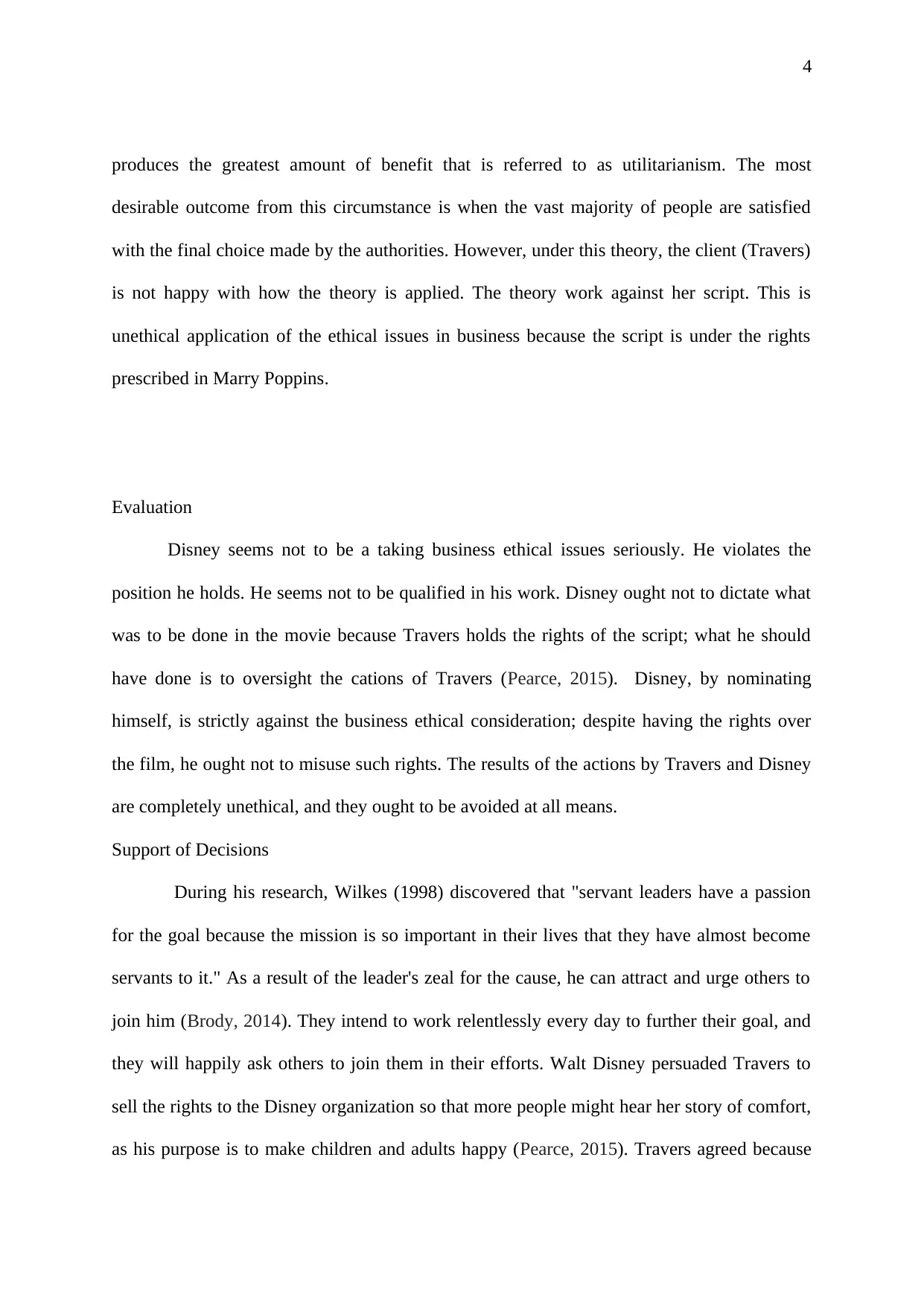
4
produces the greatest amount of benefit that is referred to as utilitarianism. The most
desirable outcome from this circumstance is when the vast majority of people are satisfied
with the final choice made by the authorities. However, under this theory, the client (Travers)
is not happy with how the theory is applied. The theory work against her script. This is
unethical application of the ethical issues in business because the script is under the rights
prescribed in Marry Poppins.
Evaluation
Disney seems not to be a taking business ethical issues seriously. He violates the
position he holds. He seems not to be qualified in his work. Disney ought not to dictate what
was to be done in the movie because Travers holds the rights of the script; what he should
have done is to oversight the cations of Travers (Pearce, 2015). Disney, by nominating
himself, is strictly against the business ethical consideration; despite having the rights over
the film, he ought not to misuse such rights. The results of the actions by Travers and Disney
are completely unethical, and they ought to be avoided at all means.
Support of Decisions
During his research, Wilkes (1998) discovered that "servant leaders have a passion
for the goal because the mission is so important in their lives that they have almost become
servants to it." As a result of the leader's zeal for the cause, he can attract and urge others to
join him (Brody, 2014). They intend to work relentlessly every day to further their goal, and
they will happily ask others to join them in their efforts. Walt Disney persuaded Travers to
sell the rights to the Disney organization so that more people might hear her story of comfort,
as his purpose is to make children and adults happy (Pearce, 2015). Travers agreed because
produces the greatest amount of benefit that is referred to as utilitarianism. The most
desirable outcome from this circumstance is when the vast majority of people are satisfied
with the final choice made by the authorities. However, under this theory, the client (Travers)
is not happy with how the theory is applied. The theory work against her script. This is
unethical application of the ethical issues in business because the script is under the rights
prescribed in Marry Poppins.
Evaluation
Disney seems not to be a taking business ethical issues seriously. He violates the
position he holds. He seems not to be qualified in his work. Disney ought not to dictate what
was to be done in the movie because Travers holds the rights of the script; what he should
have done is to oversight the cations of Travers (Pearce, 2015). Disney, by nominating
himself, is strictly against the business ethical consideration; despite having the rights over
the film, he ought not to misuse such rights. The results of the actions by Travers and Disney
are completely unethical, and they ought to be avoided at all means.
Support of Decisions
During his research, Wilkes (1998) discovered that "servant leaders have a passion
for the goal because the mission is so important in their lives that they have almost become
servants to it." As a result of the leader's zeal for the cause, he can attract and urge others to
join him (Brody, 2014). They intend to work relentlessly every day to further their goal, and
they will happily ask others to join them in their efforts. Walt Disney persuaded Travers to
sell the rights to the Disney organization so that more people might hear her story of comfort,
as his purpose is to make children and adults happy (Pearce, 2015). Travers agreed because
Paraphrase This Document
Need a fresh take? Get an instant paraphrase of this document with our AI Paraphraser
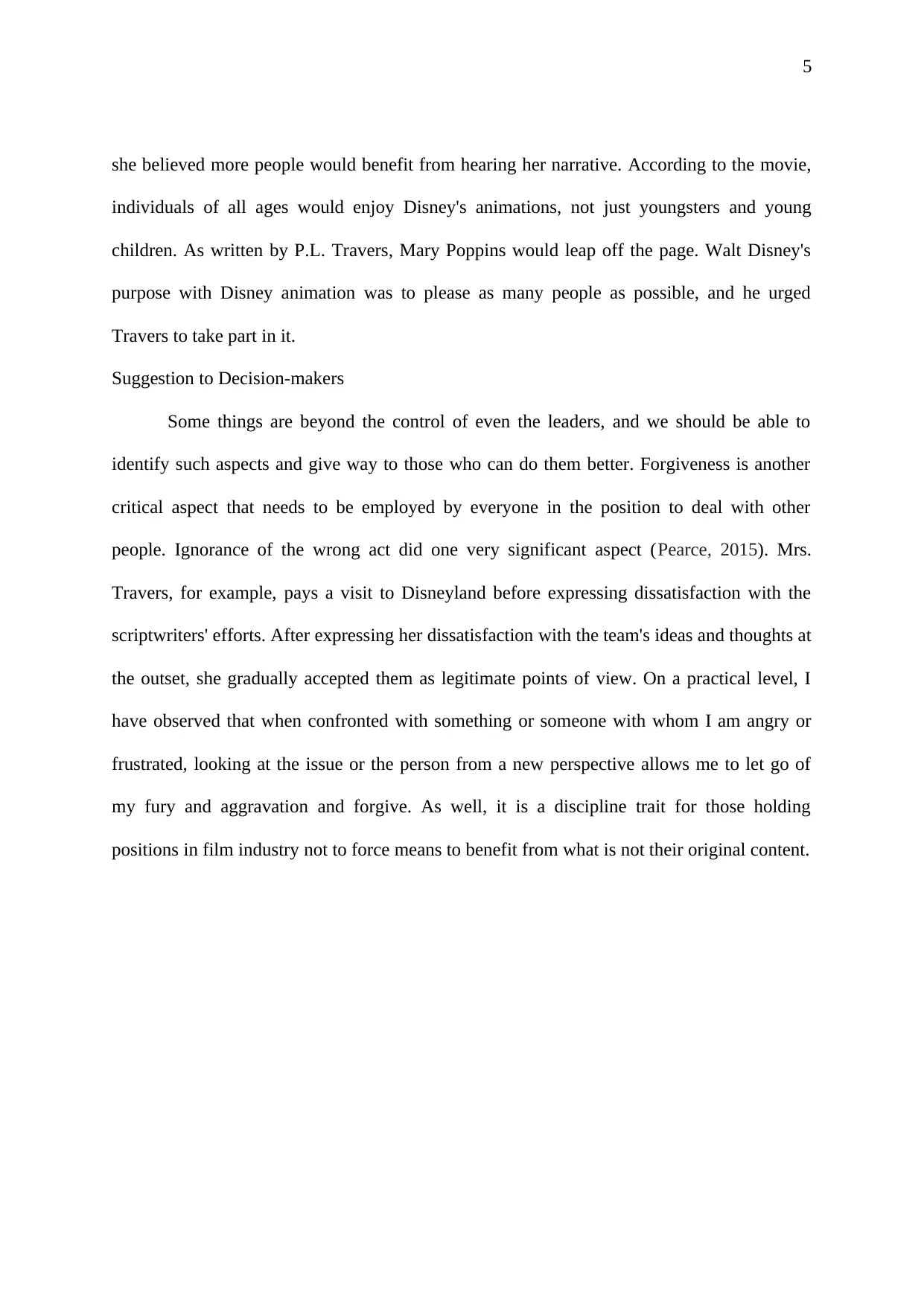
5
she believed more people would benefit from hearing her narrative. According to the movie,
individuals of all ages would enjoy Disney's animations, not just youngsters and young
children. As written by P.L. Travers, Mary Poppins would leap off the page. Walt Disney's
purpose with Disney animation was to please as many people as possible, and he urged
Travers to take part in it.
Suggestion to Decision-makers
Some things are beyond the control of even the leaders, and we should be able to
identify such aspects and give way to those who can do them better. Forgiveness is another
critical aspect that needs to be employed by everyone in the position to deal with other
people. Ignorance of the wrong act did one very significant aspect (Pearce, 2015). Mrs.
Travers, for example, pays a visit to Disneyland before expressing dissatisfaction with the
scriptwriters' efforts. After expressing her dissatisfaction with the team's ideas and thoughts at
the outset, she gradually accepted them as legitimate points of view. On a practical level, I
have observed that when confronted with something or someone with whom I am angry or
frustrated, looking at the issue or the person from a new perspective allows me to let go of
my fury and aggravation and forgive. As well, it is a discipline trait for those holding
positions in film industry not to force means to benefit from what is not their original content.
she believed more people would benefit from hearing her narrative. According to the movie,
individuals of all ages would enjoy Disney's animations, not just youngsters and young
children. As written by P.L. Travers, Mary Poppins would leap off the page. Walt Disney's
purpose with Disney animation was to please as many people as possible, and he urged
Travers to take part in it.
Suggestion to Decision-makers
Some things are beyond the control of even the leaders, and we should be able to
identify such aspects and give way to those who can do them better. Forgiveness is another
critical aspect that needs to be employed by everyone in the position to deal with other
people. Ignorance of the wrong act did one very significant aspect (Pearce, 2015). Mrs.
Travers, for example, pays a visit to Disneyland before expressing dissatisfaction with the
scriptwriters' efforts. After expressing her dissatisfaction with the team's ideas and thoughts at
the outset, she gradually accepted them as legitimate points of view. On a practical level, I
have observed that when confronted with something or someone with whom I am angry or
frustrated, looking at the issue or the person from a new perspective allows me to let go of
my fury and aggravation and forgive. As well, it is a discipline trait for those holding
positions in film industry not to force means to benefit from what is not their original content.
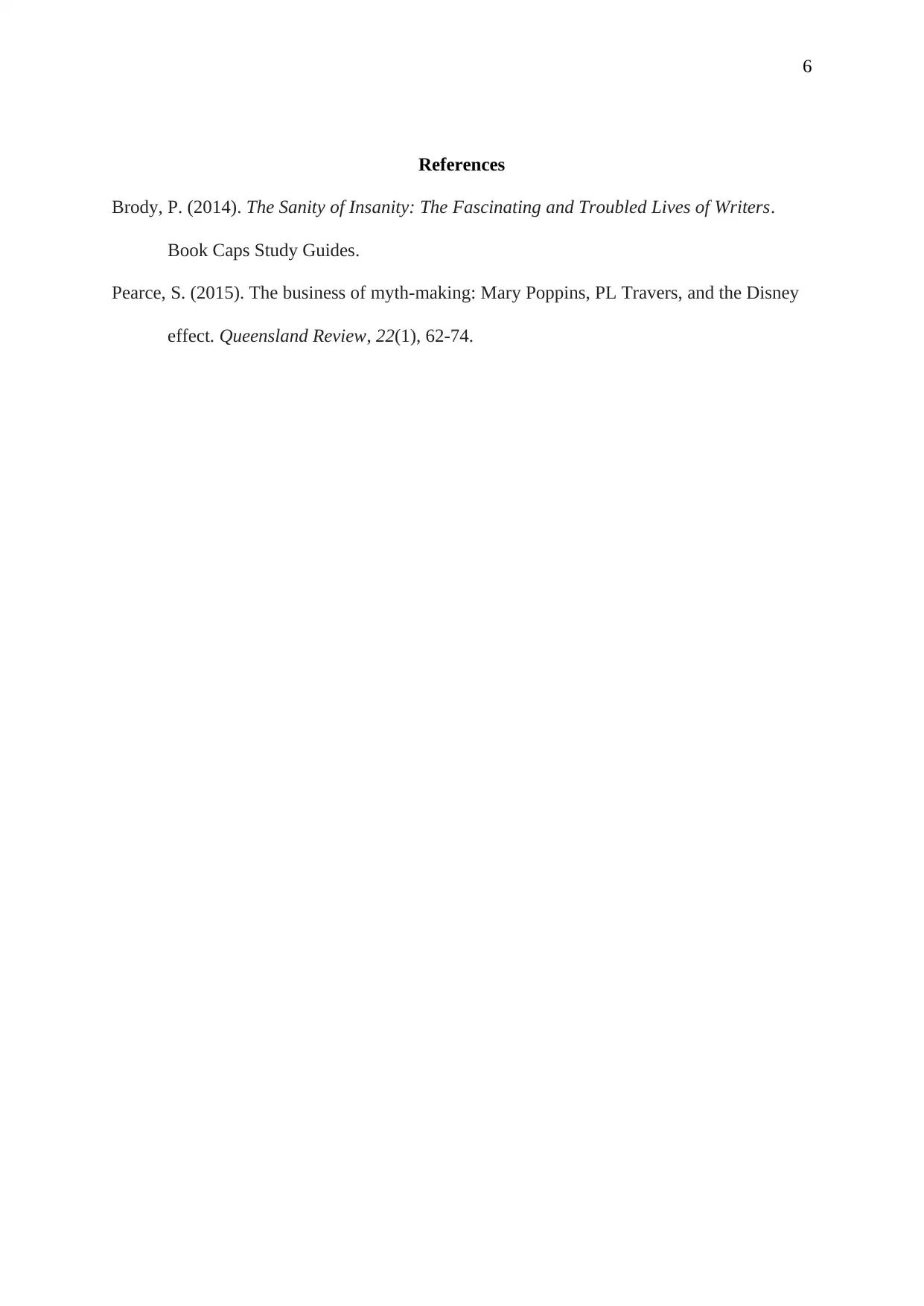
6
References
Brody, P. (2014). The Sanity of Insanity: The Fascinating and Troubled Lives of Writers.
Book Caps Study Guides.
Pearce, S. (2015). The business of myth-making: Mary Poppins, PL Travers, and the Disney
effect. Queensland Review, 22(1), 62-74.
References
Brody, P. (2014). The Sanity of Insanity: The Fascinating and Troubled Lives of Writers.
Book Caps Study Guides.
Pearce, S. (2015). The business of myth-making: Mary Poppins, PL Travers, and the Disney
effect. Queensland Review, 22(1), 62-74.
⊘ This is a preview!⊘
Do you want full access?
Subscribe today to unlock all pages.

Trusted by 1+ million students worldwide
1 out of 6
Your All-in-One AI-Powered Toolkit for Academic Success.
+13062052269
info@desklib.com
Available 24*7 on WhatsApp / Email
![[object Object]](/_next/static/media/star-bottom.7253800d.svg)
Unlock your academic potential
Copyright © 2020–2026 A2Z Services. All Rights Reserved. Developed and managed by ZUCOL.